
⇧ amazing...
UbuntuではデフォルトでPostgreSQL がインストールできるようになっているらしい
PostgreSQL の公式のドキュメントによると、
PostgreSQL is available in all Ubuntu versions by default. However, Ubuntu "snapshots" a specific version of PostgreSQL that is then supported throughout the lifetime of that Ubuntu version. Other versions of PostgreSQL are available through the PostgreSQL apt repository.
⇧ Ubuntuの全てのバージョンでPostgreSQL の利用が可能な状態になっているんだとか。
分かり辛いのだけど、Ubuntuのパッケージ管理ツールである「apt-get」でPostgreSQL がインストールできるようになっているということだと思うのだけど、デフォルトのリポジトリのままだとバージョンが旧いPostgreSQL がインストールされてしまうから、リポジトリを追加してからインストールするように、ということらしい。
UbuntuへPostgreSQL をインストールする
というわけで、2023年7月31日(月)時点の公式のドキュメントにあるように、
- Create the file repository configuration
- Import the repository signing key
- Update the package lists
- Install the latest version of PostgreSQL
という手順で、最新のPostgreSQL がインストールできるということらしい。
リリースされてるPostgreSQL のバージョンはと言うと、
⇧ 2023年7月31日(月)時点だと、15 が最新ということらしい。
いつも思うのだけど、シェルスクリプトを実行するユーザーとか場所はどこでも良いのかもしらんけど、一言、ドキュメントに記載しておいては欲しいよね...
2023年7月31日(月)時点のドキュメントの手順通りに実施していきます。
「1. Create the file repository configuration」を実施。
sudo sh -c 'echo "deb http://apt.postgresql.org/pub/repos/apt $(lsb_release -cs)-pgdg main" > /etc/apt/sources.list.d/pgdg.list'

「2. Import the repository signing key」を実施。
wget --quiet -O - https://www.postgresql.org/media/keys/ACCC4CF8.asc | sudo apt-key add -

「apt-key」が非推奨って出てるんだが、公式のドキュメントに載ってる方法だし、問題は無いってことで良いんだよね?
「3. Update the package lists」を実施。
sudo apt-get update
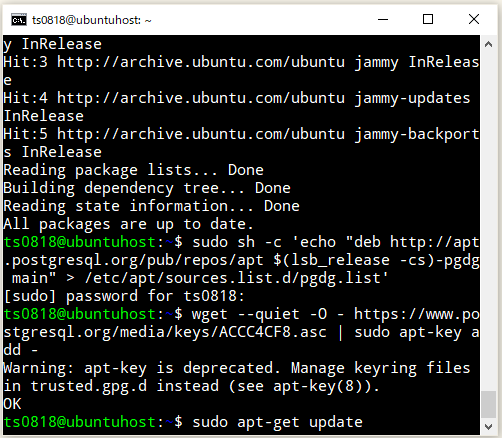
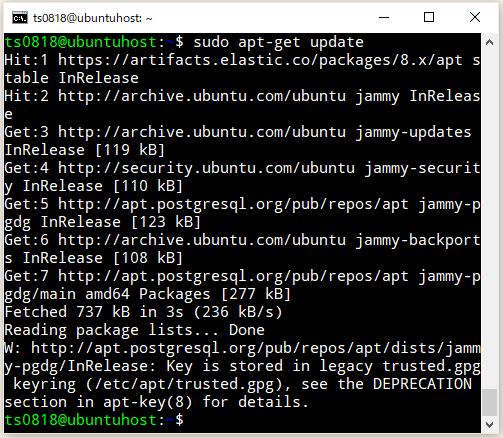
「4. Install the latest version of PostgreSQL」を実施。
sudo apt-get -y install postgresql-15

よく分からんので、デフォルトの状態でEnterキーを押下しました。

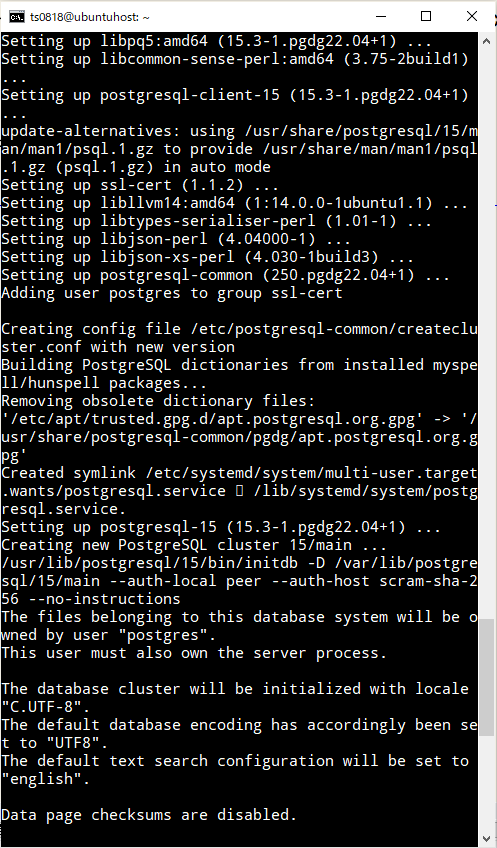

Reading package lists... Done Building dependency tree... Done Reading state information... Done The following additional packages will be installed: libcommon-sense-perl libjson-perl libjson-xs-perl libllvm14 libpq5 libtypes-serialiser-perl postgresql-client-15 postgresql-client-common postgresql-common ssl-cert Suggested packages: postgresql-doc-15 The following NEW packages will be installed: libcommon-sense-perl libjson-perl libjson-xs-perl libllvm14 libpq5 libtypes-serialiser-perl postgresql-15 postgresql-client-15 postgresql-client-common postgresql-common ssl-cert 0 upgraded, 11 newly installed, 0 to remove and 0 not upgraded. Need to get 43.3 MB of archives. After this operation, 173 MB of additional disk space will be used. Get:1 http://apt.postgresql.org/pub/repos/apt jammy-pgdg/main amd64 postgresql-client-common all 250.pgdg22.04+1 [93.2 kB] Get:2 http://archive.ubuntu.com/ubuntu jammy/main amd64 libjson-perl all 4.04000-1 [81.8 kB] Get:3 http://apt.postgresql.org/pub/repos/apt jammy-pgdg/main amd64 postgresql-common all 250.pgdg22.04+1 [239 kB] Get:4 http://archive.ubuntu.com/ubuntu jammy/main amd64 ssl-cert all 1.1.2 [17.4 kB] Get:5 http://archive.ubuntu.com/ubuntu jammy/main amd64 libcommon-sense-perl amd64 3.75-2build1 [21.1 kB] Get:6 http://archive.ubuntu.com/ubuntu jammy/main amd64 libtypes-serialiser-perl all 1.01-1 [11.6 kB] Get:7 http://archive.ubuntu.com/ubuntu jammy/main amd64 libjson-xs-perl amd64 4.030-1build3 [87.2 kB] Get:8 http://archive.ubuntu.com/ubuntu jammy-updates/main amd64 libllvm14 amd64 1:14.0.0-1ubuntu1.1 [24.0 MB] Get:9 http://apt.postgresql.org/pub/repos/apt jammy-pgdg/main amd64 libpq5 amd64 15.3-1.pgdg22.04+1 [184 kB] Get:10 http://apt.postgresql.org/pub/repos/apt jammy-pgdg/main amd64 postgresql-client-15 amd64 15.3-1.pgdg22.04+1 [1679 kB] Get:11 http://apt.postgresql.org/pub/repos/apt jammy-pgdg/main amd64 postgresql-15 amd64 15.3-1.pgdg22.04+1 [16.9 MB] Fetched 43.3 MB in 12s (3712 kB/s) Preconfiguring packages ... Selecting previously unselected package libjson-perl. (Reading database ... 137127 files and directories currently installed.) Preparing to unpack .../00-libjson-perl_4.04000-1_all.deb ... Unpacking libjson-perl (4.04000-1) ... Selecting previously unselected package postgresql-client-common. Preparing to unpack .../01-postgresql-client-common_250.pgdg22.04+1_all.deb ... Unpacking postgresql-client-common (250.pgdg22.04+1) ... Selecting previously unselected package ssl-cert. Preparing to unpack .../02-ssl-cert_1.1.2_all.deb ... Unpacking ssl-cert (1.1.2) ... Selecting previously unselected package postgresql-common. Preparing to unpack .../03-postgresql-common_250.pgdg22.04+1_all.deb ... Adding 'diversion of /usr/bin/pg_config to /usr/bin/pg_config.libpq-dev by postgresql-common' Unpacking postgresql-common (250.pgdg22.04+1) ... Selecting previously unselected package libcommon-sense-perl:amd64. Preparing to unpack .../04-libcommon-sense-perl_3.75-2build1_amd64.deb ... Unpacking libcommon-sense-perl:amd64 (3.75-2build1) ... Selecting previously unselected package libtypes-serialiser-perl. Preparing to unpack .../05-libtypes-serialiser-perl_1.01-1_all.deb ... Unpacking libtypes-serialiser-perl (1.01-1) ... Selecting previously unselected package libjson-xs-perl. Preparing to unpack .../06-libjson-xs-perl_4.030-1build3_amd64.deb ... Unpacking libjson-xs-perl (4.030-1build3) ... Selecting previously unselected package libllvm14:amd64. Preparing to unpack .../07-libllvm14_1%3a14.0.0-1ubuntu1.1_amd64.deb ... Unpacking libllvm14:amd64 (1:14.0.0-1ubuntu1.1) ... Selecting previously unselected package libpq5:amd64. Preparing to unpack .../08-libpq5_15.3-1.pgdg22.04+1_amd64.deb ... Unpacking libpq5:amd64 (15.3-1.pgdg22.04+1) ... Selecting previously unselected package postgresql-client-15. Preparing to unpack .../09-postgresql-client-15_15.3-1.pgdg22.04+1_amd64.deb ... Unpacking postgresql-client-15 (15.3-1.pgdg22.04+1) ... Selecting previously unselected package postgresql-15. Preparing to unpack .../10-postgresql-15_15.3-1.pgdg22.04+1_amd64.deb ... Unpacking postgresql-15 (15.3-1.pgdg22.04+1) ... Setting up postgresql-client-common (250.pgdg22.04+1) ... Setting up libpq5:amd64 (15.3-1.pgdg22.04+1) ... Setting up libcommon-sense-perl:amd64 (3.75-2build1) ... Setting up postgresql-client-15 (15.3-1.pgdg22.04+1) ... update-alternatives: using /usr/share/postgresql/15/man/man1/psql.1.gz to provide /usr/share/man/man1/psql.1.gz (psql.1.gz) in auto mode Setting up ssl-cert (1.1.2) ... Setting up libllvm14:amd64 (1:14.0.0-1ubuntu1.1) ... Setting up libtypes-serialiser-perl (1.01-1) ... Setting up libjson-perl (4.04000-1) ... Setting up libjson-xs-perl (4.030-1build3) ... Setting up postgresql-common (250.pgdg22.04+1) ... Adding user postgres to group ssl-cert Creating config file /etc/postgresql-common/createcluster.conf with new version Building PostgreSQL dictionaries from installed myspell/hunspell packages... Removing obsolete dictionary files: '/etc/apt/trusted.gpg.d/apt.postgresql.org.gpg' -> '/usr/share/postgresql-common/pgdg/apt.postgresql.org.gpg' Created symlink /etc/systemd/system/multi-user.target.wants/postgresql.service → /lib/systemd/system/postgresql.service. Setting up postgresql-15 (15.3-1.pgdg22.04+1) ... Creating new PostgreSQL cluster 15/main ... /usr/lib/postgresql/15/bin/initdb -D /var/lib/postgresql/15/main --auth-local peer --auth-host scram-sha-256 --no-instructions The files belonging to this database system will be owned by user "postgres". This user must also own the server process. The database cluster will be initialized with locale "C.UTF-8". The default database encoding has accordingly been set to "UTF8". The default text search configuration will be set to "english". Data page checksums are disabled. fixing permissions on existing directory /var/lib/postgresql/15/main ... ok creating subdirectories ... ok selecting dynamic shared memory implementation ... posix selecting default max_connections ... 100 selecting default shared_buffers ... 128MB selecting default time zone ... Asia/Tokyo creating configuration files ... ok running bootstrap script ... ok performing post-bootstrap initialization ... ok syncing data to disk ... ok Processing triggers for man-db (2.10.2-1) ... Processing triggers for libc-bin (2.35-0ubuntu3.1) ... Scanning processes... Scanning candidates... Restarting services... /etc/needrestart/restart.d/systemd-manager systemctl restart console-getty.service elasticsearch.service polkit.service systemd-journald.service systemd-networkd.service systemd-resolved.service Service restarts being deferred: /etc/needrestart/restart.d/dbus.service systemctl restart getty@tty1.service systemctl restart systemd-logind.service systemctl restart unattended-upgrades.service No containers need to be restarted. No user sessions are running outdated binaries. No VM guests are running outdated hypervisor (qemu) binaries on this host.
PostgreSQL がインストールできたということで良いんかな?
初回ログイン、ユーザー認証方法追加、ユーザー作成、データベース作成
あとは、開発で利用できるように、準備をしていく。
⇧ 上記サイト様を参考に進める。
■初回ログイン
sudo -u postgres psql

ログインできることを確認。
■ユーザー認証方法追加
一旦、PostgreSQL の接続を切断。
quit

ユーザー認証方法を追加します。
sudo vi /etc/postgresql/15/main/pg_hba.conf
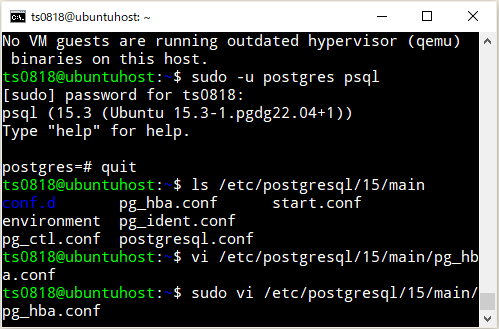
「/etc/postgresql/15/main/pg_hba.conf」ファイルに追加。
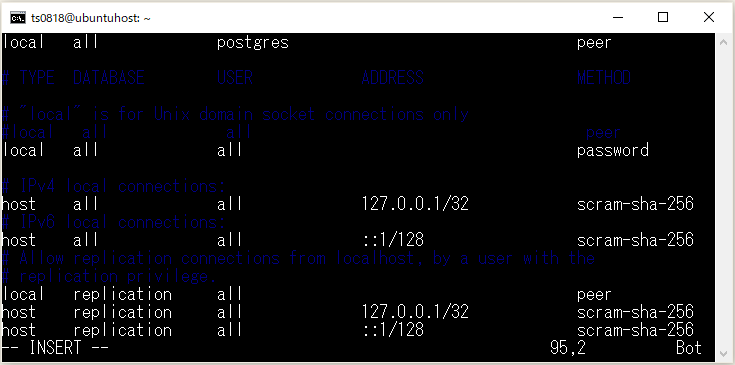
# PostgreSQL Client Authentication Configuration File # =================================================== # # Refer to the "Client Authentication" section in the PostgreSQL # documentation for a complete description of this file. A short # synopsis follows. # # This file controls: which hosts are allowed to connect, how clients # are authenticated, which PostgreSQL user names they can use, which # databases they can access. Records take one of these forms: # # local DATABASE USER METHOD [OPTIONS] # host DATABASE USER ADDRESS METHOD [OPTIONS] # hostssl DATABASE USER ADDRESS METHOD [OPTIONS] # hostnossl DATABASE USER ADDRESS METHOD [OPTIONS] # hostgssenc DATABASE USER ADDRESS METHOD [OPTIONS] # hostnogssenc DATABASE USER ADDRESS METHOD [OPTIONS] # # (The uppercase items must be replaced by actual values.) # # The first field is the connection type: # - "local" is a Unix-domain socket # - "host" is a TCP/IP socket (encrypted or not) # - "hostssl" is a TCP/IP socket that is SSL-encrypted # - "hostnossl" is a TCP/IP socket that is not SSL-encrypted # - "hostgssenc" is a TCP/IP socket that is GSSAPI-encrypted # - "hostnogssenc" is a TCP/IP socket that is not GSSAPI-encrypted # # DATABASE can be "all", "sameuser", "samerole", "replication", a # database name, or a comma-separated list thereof. The "all" # keyword does not match "replication". Access to replication # must be enabled in a separate record (see example below). # # USER can be "all", a user name, a group name prefixed with "+", or a # comma-separated list thereof. In both the DATABASE and USER fields # you can also write a file name prefixed with "@" to include names # from a separate file. # # ADDRESS specifies the set of hosts the record matches. It can be a # host name, or it is made up of an IP address and a CIDR mask that is # an integer (between 0 and 32 (IPv4) or 128 (IPv6) inclusive) that # specifies the number of significant bits in the mask. A host name # that starts with a dot (.) matches a suffix of the actual host name. # Alternatively, you can write an IP address and netmask in separate # columns to specify the set of hosts. Instead of a CIDR-address, you # can write "samehost" to match any of the server's own IP addresses, # or "samenet" to match any address in any subnet that the server is # directly connected to. # # METHOD can be "trust", "reject", "md5", "password", "scram-sha-256", # "gss", "sspi", "ident", "peer", "pam", "ldap", "radius" or "cert". # Note that "password" sends passwords in clear text; "md5" or # "scram-sha-256" are preferred since they send encrypted passwords. # # OPTIONS are a set of options for the authentication in the format # NAME=VALUE. The available options depend on the different # authentication methods -- refer to the "Client Authentication" # section in the documentation for a list of which options are # available for which authentication methods. # # Database and user names containing spaces, commas, quotes and other # special characters must be quoted. Quoting one of the keywords # "all", "sameuser", "samerole" or "replication" makes the name lose # its special character, and just match a database or username with # that name. # # This file is read on server startup and when the server receives a # SIGHUP signal. If you edit the file on a running system, you have to # SIGHUP the server for the changes to take effect, run "pg_ctl reload", # or execute "SELECT pg_reload_conf()". # # Put your actual configuration here # ---------------------------------- # # If you want to allow non-local connections, you need to add more # "host" records. In that case you will also need to make PostgreSQL # listen on a non-local interface via the listen_addresses # configuration parameter, or via the -i or -h command line switches. # DO NOT DISABLE! # If you change this first entry you will need to make sure that the # database superuser can access the database using some other method. # Noninteractive access to all databases is required during automatic # maintenance (custom daily cronjobs, replication, and similar tasks). # # Database administrative login by Unix domain socket local all postgres peer # TYPE DATABASE USER ADDRESS METHOD # "local" is for Unix domain socket connections only #local all all peer local all all password # IPv4 local connections: host all all 127.0.0.1/32 scram-sha-256 host all all all password # IPv6 local connections: host all all ::1/128 scram-sha-256 # Allow replication connections from localhost, by a user with the # replication privilege. local replication all peer host replication all 127.0.0.1/32 scram-sha-256 host replication all ::1/128 scram-sha-256
外部から接続できるように、「listen_addresses = '*'」を有効にしておく。
# "#" anywhere on a line. The complete list of parameter names and allowed
# values can be found in the PostgreSQL documentation.
#
# The commented-out settings shown in this file represent the default values.
# Re-commenting a setting is NOT sufficient to revert it to the default value;
# you need to reload the server.
#
# This file is read on server startup and when the server receives a SIGHUP
# signal. If you edit the file on a running system, you have to SIGHUP the
# server for the changes to take effect, run "pg_ctl reload", or execute
# "SELECT pg_reload_conf()". Some parameters, which are marked below,
# require a server shutdown and restart to take effect.
#
# Any parameter can also be given as a command-line option to the server, e.g.,
# "postgres -c log_connections=on". Some parameters can be changed at run time
# with the "SET" SQL command.
#
# Memory units: B = bytes Time units: us = microseconds
# kB = kilobytes ms = milliseconds
# MB = megabytes s = seconds
# GB = gigabytes min = minutes
# TB = terabytes h = hours
# d = days
#------------------------------------------------------------------------------
# FILE LOCATIONS
#------------------------------------------------------------------------------
# The default values of these variables are driven from the -D command-line
# option or PGDATA environment variable, represented here as ConfigDir.
data_directory = '/var/lib/postgresql/15/main' # use data in another directory
# (change requires restart)
hba_file = '/etc/postgresql/15/main/pg_hba.conf' # host-based authentication file
# (change requires restart)
ident_file = '/etc/postgresql/15/main/pg_ident.conf' # ident configuration file
# (change requires restart)
# If external_pid_file is not explicitly set, no extra PID file is written.
external_pid_file = '/var/run/postgresql/15-main.pid' # write an extra PID file
# (change requires restart)
#------------------------------------------------------------------------------
# CONNECTIONS AND AUTHENTICATION
#------------------------------------------------------------------------------
# - Connection Settings -
listen_addresses = '*' # what IP address(es) to listen on;
# comma-separated list of addresses;
# defaults to 'localhost'; use '*' for all
# (change requires restart)
port = 5432 # (change requires restart)
max_connections = 100 # (change requires restart)
#superuser_reserved_connections = 3 # (change requires restart)
unix_socket_directories = '/var/run/postgresql' # comma-separated list of directories
# (change requires restart)
#unix_socket_group = '' # (change requires restart)
#unix_socket_permissions = 0777 # begin with 0 to use octal notation
# (change requires restart)
#bonjour = off # advertise server via Bonjour
# (change requires restart)
#bonjour_name = '' # defaults to the computer name
# (change requires restart)
# - TCP settings -
# see "man tcp" for details
#tcp_keepalives_idle = 0 # TCP_KEEPIDLE, in seconds;
# 0 selects the system default
#tcp_keepalives_interval = 0 # TCP_KEEPINTVL, in seconds;
# 0 selects the system default
#tcp_keepalives_count = 0 # TCP_KEEPCNT;
# 0 selects the system default
#tcp_user_timeout = 0 # TCP_USER_TIMEOUT, in milliseconds;
# 0 selects the system default
#client_connection_check_interval = 0 # time between checks for client
# disconnection while running queries;
# 0 for never
# - Authentication -
#authentication_timeout = 1min # 1s-600s
#password_encryption = scram-sha-256 # scram-sha-256 or md5
#db_user_namespace = off
# GSSAPI using Kerberos
#krb_server_keyfile = 'FILE:${sysconfdir}/krb5.keytab'
#krb_caseins_users = off
# - SSL -
ssl = on
#ssl_ca_file = ''
ssl_cert_file = '/etc/ssl/certs/ssl-cert-snakeoil.pem'
#ssl_crl_file = ''
#ssl_crl_dir = ''
ssl_key_file = '/etc/ssl/private/ssl-cert-snakeoil.key'
#ssl_ciphers = 'HIGH:MEDIUM:+3DES:!aNULL' # allowed SSL ciphers
#ssl_prefer_server_ciphers = on
#ssl_ecdh_curve = 'prime256v1'
#ssl_min_protocol_version = 'TLSv1.2'
#ssl_max_protocol_version = ''
#ssl_dh_params_file = ''
#ssl_passphrase_command_supports_reload = off
#------------------------------------------------------------------------------
# RESOURCE USAGE (except WAL)
#------------------------------------------------------------------------------
# - Memory -
shared_buffers = 128MB # min 128kB
# (change requires restart)
#huge_pages = try # on, off, or try
# (change requires restart)
#huge_page_size = 0 # zero for system default
# (change requires restart)
#temp_buffers = 8MB # min 800kB
#max_prepared_transactions = 0 # zero disables the feature
# (change requires restart)
# Caution: it is not advisable to set max_prepared_transactions nonzero unless
# you actively intend to use prepared transactions.
#work_mem = 4MB # min 64kB
#hash_mem_multiplier = 2.0 # 1-1000.0 multiplier on hash table work_mem
#maintenance_work_mem = 64MB # min 1MB
#autovacuum_work_mem = -1 # min 1MB, or -1 to use maintenance_work_mem
#logical_decoding_work_mem = 64MB # min 64kB
#max_stack_depth = 2MB # min 100kB
#shared_memory_type = mmap # the default is the first option
# supported by the operating system:
# mmap
# sysv
# windows
# (change requires restart)
dynamic_shared_memory_type = posix # the default is usually the first option
# supported by the operating system:
# posix
# sysv
# windows
# mmap
# (change requires restart)
#min_dynamic_shared_memory = 0MB # (change requires restart)
# - Disk -
#temp_file_limit = -1 # limits per-process temp file space
# in kilobytes, or -1 for no limit
# - Kernel Resources -
#max_files_per_process = 1000 # min 64
# (change requires restart)
# - Cost-Based Vacuum Delay -
#vacuum_cost_delay = 0 # 0-100 milliseconds (0 disables)
#vacuum_cost_page_hit = 1 # 0-10000 credits
#vacuum_cost_page_miss = 2 # 0-10000 credits
#vacuum_cost_page_dirty = 20 # 0-10000 credits
#vacuum_cost_limit = 200 # 1-10000 credits
# - Background Writer -
#bgwriter_delay = 200ms # 10-10000ms between rounds
#bgwriter_lru_maxpages = 100 # max buffers written/round, 0 disables
#bgwriter_lru_multiplier = 2.0 # 0-10.0 multiplier on buffers scanned/round
#bgwriter_flush_after = 512kB # measured in pages, 0 disables
# - Asynchronous Behavior -
#backend_flush_after = 0 # measured in pages, 0 disables
#effective_io_concurrency = 1 # 1-1000; 0 disables prefetching
#maintenance_io_concurrency = 10 # 1-1000; 0 disables prefetching
#max_worker_processes = 8 # (change requires restart)
#max_parallel_workers_per_gather = 2 # taken from max_parallel_workers
#max_parallel_maintenance_workers = 2 # taken from max_parallel_workers
#max_parallel_workers = 8 # maximum number of max_worker_processes that
# can be used in parallel operations
#parallel_leader_participation = on
#old_snapshot_threshold = -1 # 1min-60d; -1 disables; 0 is immediate
# (change requires restart)
#------------------------------------------------------------------------------
# WRITE-AHEAD LOG
#------------------------------------------------------------------------------
# - Settings -
#wal_level = replica # minimal, replica, or logical
# (change requires restart)
#fsync = on # flush data to disk for crash safety
# (turning this off can cause
# unrecoverable data corruption)
#synchronous_commit = on # synchronization level;
# off, local, remote_write, remote_apply, or on
#wal_sync_method = fsync # the default is the first option
# supported by the operating system:
# open_datasync
# fdatasync (default on Linux and FreeBSD)
# fsync
# fsync_writethrough
# open_sync
#full_page_writes = on # recover from partial page writes
#wal_log_hints = off # also do full page writes of non-critical updates
# (change requires restart)
#wal_compression = off # enables compression of full-page writes;
# off, pglz, lz4, zstd, or on
#wal_init_zero = on # zero-fill new WAL files
#wal_recycle = on # recycle WAL files
#wal_buffers = -1 # min 32kB, -1 sets based on shared_buffers
# (change requires restart)
#wal_writer_delay = 200ms # 1-10000 milliseconds
#wal_writer_flush_after = 1MB # measured in pages, 0 disables
#wal_skip_threshold = 2MB
#commit_delay = 0 # range 0-100000, in microseconds
#commit_siblings = 5 # range 1-1000
# - Checkpoints -
#checkpoint_timeout = 5min # range 30s-1d
#checkpoint_completion_target = 0.9 # checkpoint target duration, 0.0 - 1.0
#checkpoint_flush_after = 256kB # measured in pages, 0 disables
#checkpoint_warning = 30s # 0 disables
max_wal_size = 1GB
min_wal_size = 80MB
# - Prefetching during recovery -
#recovery_prefetch = try # prefetch pages referenced in the WAL?
#wal_decode_buffer_size = 512kB # lookahead window used for prefetching
# (change requires restart)
# - Archiving -
#archive_mode = off # enables archiving; off, on, or always
# (change requires restart)
#archive_library = '' # library to use to archive a logfile segment
# (empty string indicates archive_command should
# be used)
#archive_command = '' # command to use to archive a logfile segment
# placeholders: %p = path of file to archive
# %f = file name only
# e.g. 'test ! -f /mnt/server/archivedir/%f && cp %p /mnt/server/archivedir/%f'
#archive_timeout = 0 # force a logfile segment switch after this
# number of seconds; 0 disables
# - Archive Recovery -
# These are only used in recovery mode.
#restore_command = '' # command to use to restore an archived logfile segment
# placeholders: %p = path of file to restore
# %f = file name only
# e.g. 'cp /mnt/server/archivedir/%f %p'
#archive_cleanup_command = '' # command to execute at every restartpoint
#recovery_end_command = '' # command to execute at completion of recovery
# - Recovery Target -
# Set these only when performing a targeted recovery.
#recovery_target = '' # 'immediate' to end recovery as soon as a
# consistent state is reached
# (change requires restart)
#recovery_target_name = '' # the named restore point to which recovery will proceed
# (change requires restart)
#recovery_target_time = '' # the time stamp up to which recovery will proceed
# (change requires restart)
#recovery_target_xid = '' # the transaction ID up to which recovery will proceed
# (change requires restart)
#recovery_target_lsn = '' # the WAL LSN up to which recovery will proceed
# (change requires restart)
#recovery_target_inclusive = on # Specifies whether to stop:
# just after the specified recovery target (on)
# just before the recovery target (off)
# (change requires restart)
#recovery_target_timeline = 'latest' # 'current', 'latest', or timeline ID
# (change requires restart)
#------------------------------------------------------------------------------
# REPLICATION
#------------------------------------------------------------------------------
# - Sending Servers -
# Set these on the primary and on any standby that will send replication data.
#max_wal_senders = 10 # max number of walsender processes
# (change requires restart)
#max_replication_slots = 10 # max number of replication slots
# (change requires restart)
#wal_keep_size = 0 # in megabytes; 0 disables
#max_slot_wal_keep_size = -1 # in megabytes; -1 disables
#wal_sender_timeout = 60s # in milliseconds; 0 disables
#track_commit_timestamp = off # collect timestamp of transaction commit
# (change requires restart)
# - Primary Server -
# These settings are ignored on a standby server.
#synchronous_standby_names = '' # standby servers that provide sync rep
# method to choose sync standbys, number of sync standbys,
# and comma-separated list of application_name
# from standby(s); '*' = all
#vacuum_defer_cleanup_age = 0 # number of xacts by which cleanup is delayed
# - Standby Servers -
# These settings are ignored on a primary server.
#primary_conninfo = '' # connection string to sending server
#primary_slot_name = '' # replication slot on sending server
#promote_trigger_file = '' # file name whose presence ends recovery
#hot_standby = on # "off" disallows queries during recovery
# (change requires restart)
#max_standby_archive_delay = 30s # max delay before canceling queries
# when reading WAL from archive;
# -1 allows indefinite delay
#max_standby_streaming_delay = 30s # max delay before canceling queries
# when reading streaming WAL;
# -1 allows indefinite delay
#wal_receiver_create_temp_slot = off # create temp slot if primary_slot_name
# is not set
#wal_receiver_status_interval = 10s # send replies at least this often
# 0 disables
#hot_standby_feedback = off # send info from standby to prevent
# query conflicts
#wal_receiver_timeout = 60s # time that receiver waits for
# communication from primary
# in milliseconds; 0 disables
#wal_retrieve_retry_interval = 5s # time to wait before retrying to
# retrieve WAL after a failed attempt
#recovery_min_apply_delay = 0 # minimum delay for applying changes during recovery
# - Subscribers -
# These settings are ignored on a publisher.
#max_logical_replication_workers = 4 # taken from max_worker_processes
# (change requires restart)
#max_sync_workers_per_subscription = 2 # taken from max_logical_replication_workers
#------------------------------------------------------------------------------
# QUERY TUNING
#------------------------------------------------------------------------------
# - Planner Method Configuration -
#enable_async_append = on
#enable_bitmapscan = on
#enable_gathermerge = on
#enable_hashagg = on
#enable_hashjoin = on
#enable_incremental_sort = on
#enable_indexscan = on
#enable_indexonlyscan = on
#enable_material = on
#enable_memoize = on
#enable_mergejoin = on
#enable_nestloop = on
#enable_parallel_append = on
#enable_parallel_hash = on
#enable_partition_pruning = on
#enable_partitionwise_join = off
#enable_partitionwise_aggregate = off
#enable_seqscan = on
#enable_sort = on
#enable_tidscan = on
# - Planner Cost Constants -
#seq_page_cost = 1.0 # measured on an arbitrary scale
#random_page_cost = 4.0 # same scale as above
#cpu_tuple_cost = 0.01 # same scale as above
#cpu_index_tuple_cost = 0.005 # same scale as above
#cpu_operator_cost = 0.0025 # same scale as above
#parallel_setup_cost = 1000.0 # same scale as above
#parallel_tuple_cost = 0.1 # same scale as above
#min_parallel_table_scan_size = 8MB
#min_parallel_index_scan_size = 512kB
#effective_cache_size = 4GB
#jit_above_cost = 100000 # perform JIT compilation if available
# and query more expensive than this;
# -1 disables
#jit_inline_above_cost = 500000 # inline small functions if query is
# more expensive than this; -1 disables
#jit_optimize_above_cost = 500000 # use expensive JIT optimizations if
# query is more expensive than this;
# -1 disables
# - Genetic Query Optimizer -
#geqo = on
#geqo_threshold = 12
#geqo_effort = 5 # range 1-10
#geqo_pool_size = 0 # selects default based on effort
#geqo_generations = 0 # selects default based on effort
#geqo_selection_bias = 2.0 # range 1.5-2.0
#geqo_seed = 0.0 # range 0.0-1.0
# - Other Planner Options -
#default_statistics_target = 100 # range 1-10000
#constraint_exclusion = partition # on, off, or partition
#cursor_tuple_fraction = 0.1 # range 0.0-1.0
#from_collapse_limit = 8
#jit = on # allow JIT compilation
#join_collapse_limit = 8 # 1 disables collapsing of explicit
# JOIN clauses
#plan_cache_mode = auto # auto, force_generic_plan or
# force_custom_plan
#recursive_worktable_factor = 10.0 # range 0.001-1000000
#------------------------------------------------------------------------------
# REPORTING AND LOGGING
#------------------------------------------------------------------------------
# - Where to Log -
#log_destination = 'stderr' # Valid values are combinations of
# stderr, csvlog, jsonlog, syslog, and
# eventlog, depending on platform.
# csvlog and jsonlog require
# logging_collector to be on.
# This is used when logging to stderr:
#logging_collector = off # Enable capturing of stderr, jsonlog,
# and csvlog into log files. Required
# to be on for csvlogs and jsonlogs.
# (change requires restart)
# These are only used if logging_collector is on:
#log_directory = 'log' # directory where log files are written,
# can be absolute or relative to PGDATA
#log_filename = 'postgresql-%Y-%m-%d_%H%M%S.log' # log file name pattern,
# can include strftime() escapes
#log_file_mode = 0600 # creation mode for log files,
# begin with 0 to use octal notation
#log_rotation_age = 1d # Automatic rotation of logfiles will
# happen after that time. 0 disables.
#log_rotation_size = 10MB # Automatic rotation of logfiles will
# happen after that much log output.
# 0 disables.
#log_truncate_on_rotation = off # If on, an existing log file with the
# same name as the new log file will be
# truncated rather than appended to.
# But such truncation only occurs on
# time-driven rotation, not on restarts
# or size-driven rotation. Default is
# off, meaning append to existing files
# in all cases.
# These are relevant when logging to syslog:
#syslog_facility = 'LOCAL0'
#syslog_ident = 'postgres'
#syslog_sequence_numbers = on
#syslog_split_messages = on
# This is only relevant when logging to eventlog (Windows):
# (change requires restart)
#event_source = 'PostgreSQL'
# - When to Log -
#log_min_messages = warning # values in order of decreasing detail:
# debug5
# debug4
# debug3
# debug2
# debug1
# info
# notice
# warning
# error
# log
# fatal
# panic
#log_min_error_statement = error # values in order of decreasing detail:
# debug5
# debug4
# debug3
# debug2
# debug1
# info
# notice
# warning
# error
# log
# fatal
# panic (effectively off)
#log_min_duration_statement = -1 # -1 is disabled, 0 logs all statements
# and their durations, > 0 logs only
# statements running at least this number
# of milliseconds
#log_min_duration_sample = -1 # -1 is disabled, 0 logs a sample of statements
# and their durations, > 0 logs only a sample of
# statements running at least this number
# of milliseconds;
# sample fraction is determined by log_statement_sample_rate
#log_statement_sample_rate = 1.0 # fraction of logged statements exceeding
# log_min_duration_sample to be logged;
# 1.0 logs all such statements, 0.0 never logs
#log_transaction_sample_rate = 0.0 # fraction of transactions whose statements
# are logged regardless of their duration; 1.0 logs all
# statements from all transactions, 0.0 never logs
#log_transaction_sample_rate = 0.0 # fraction of transactions whose statements
# are logged regardless of their duration; 1.0 logs all
# statements from all transactions, 0.0 never logs
#log_startup_progress_interval = 10s # Time between progress updates for
# long-running startup operations.
# 0 disables the feature, > 0 indicates
# the interval in milliseconds.
# - What to Log -
#debug_print_parse = off
#debug_print_rewritten = off
#debug_print_plan = off
#debug_pretty_print = on
#log_autovacuum_min_duration = 10min # log autovacuum activity;
# -1 disables, 0 logs all actions and
# their durations, > 0 logs only
# actions running at least this number
# of milliseconds.
#log_checkpoints = on
#log_connections = off
#log_disconnections = off
#log_duration = off
#log_error_verbosity = default # terse, default, or verbose messages
#log_hostname = off
log_line_prefix = '%m [%p] %q%u@%d ' # special values:
# %a = application name
# %u = user name
# %d = database name
# %r = remote host and port
# %h = remote host
# %b = backend type
# %p = process ID
# %P = process ID of parallel group leader
# %t = timestamp without milliseconds
# %m = timestamp with milliseconds
# %n = timestamp with milliseconds (as a Unix epoch)
# %Q = query ID (0 if none or not computed)
# %i = command tag
# %e = SQL state
# %c = session ID
# %l = session line number
# %s = session start timestamp
# %v = virtual transaction ID
# %x = transaction ID (0 if none)
# %q = stop here in non-session
# processes
# %% = '%'
# e.g. '<%u%%%d> '
#log_lock_waits = off # log lock waits >= deadlock_timeout
#log_recovery_conflict_waits = off # log standby recovery conflict waits
# >= deadlock_timeout
#log_parameter_max_length = -1 # when logging statements, limit logged
# bind-parameter values to N bytes;
# -1 means print in full, 0 disables
#log_parameter_max_length_on_error = 0 # when logging an error, limit logged
# bind-parameter values to N bytes;
# -1 means print in full, 0 disables
#log_statement = 'none' # none, ddl, mod, all
#log_replication_commands = off
#log_temp_files = -1 # log temporary files equal or larger
# than the specified size in kilobytes;
# -1 disables, 0 logs all temp files
log_timezone = 'Asia/Tokyo'
#------------------------------------------------------------------------------
# PROCESS TITLE
#------------------------------------------------------------------------------
cluster_name = '15/main' # added to process titles if nonempty
# (change requires restart)
#update_process_title = on
#------------------------------------------------------------------------------
# STATISTICS
#------------------------------------------------------------------------------
# - Cumulative Query and Index Statistics -
#track_activities = on
#track_activity_query_size = 1024 # (change requires restart)
#track_counts = on
#track_io_timing = off
#track_wal_io_timing = off
#track_functions = none # none, pl, all
#stats_fetch_consistency = cache
# - Monitoring -
#compute_query_id = auto
#log_statement_stats = off
#log_parser_stats = off
#log_planner_stats = off
#log_executor_stats = off
#------------------------------------------------------------------------------
# AUTOVACUUM
#------------------------------------------------------------------------------
#autovacuum = on # Enable autovacuum subprocess? 'on'
# requires track_counts to also be on.
#autovacuum_max_workers = 3 # max number of autovacuum subprocesses
# (change requires restart)
#autovacuum_naptime = 1min # time between autovacuum runs
#autovacuum_vacuum_threshold = 50 # min number of row updates before
# vacuum
#autovacuum_vacuum_insert_threshold = 1000 # min number of row inserts
# before vacuum; -1 disables insert
# vacuums
#autovacuum_analyze_threshold = 50 # min number of row updates before
# analyze
#autovacuum_vacuum_scale_factor = 0.2 # fraction of table size before vacuum
#autovacuum_vacuum_insert_scale_factor = 0.2 # fraction of inserts over table
# size before insert vacuum
#autovacuum_analyze_scale_factor = 0.1 # fraction of table size before analyze
#autovacuum_freeze_max_age = 200000000 # maximum XID age before forced vacuum
# (change requires restart)
#autovacuum_multixact_freeze_max_age = 400000000 # maximum multixact age
# before forced vacuum
# (change requires restart)
#autovacuum_vacuum_cost_delay = 2ms # default vacuum cost delay for
# autovacuum, in milliseconds;
# -1 means use vacuum_cost_delay
#autovacuum_vacuum_cost_limit = -1 # default vacuum cost limit for
# autovacuum, -1 means use
# vacuum_cost_limit
#------------------------------------------------------------------------------
# CLIENT CONNECTION DEFAULTS
#------------------------------------------------------------------------------
# - Statement Behavior -
#client_min_messages = notice # values in order of decreasing detail:
# debug5
# debug4
# debug3
# debug2
# debug1
# log
# notice
# warning
# error
#search_path = '"$user", public' # schema names
#row_security = on
#default_table_access_method = 'heap'
#default_tablespace = '' # a tablespace name, '' uses the default
#default_toast_compression = 'pglz' # 'pglz' or 'lz4'
#temp_tablespaces = '' # a list of tablespace names, '' uses
# only default tablespace
#check_function_bodies = on
#default_transaction_isolation = 'read committed'
#default_transaction_read_only = off
#default_transaction_deferrable = off
#session_replication_role = 'origin'
#statement_timeout = 0 # in milliseconds, 0 is disabled
#lock_timeout = 0 # in milliseconds, 0 is disabled
#idle_in_transaction_session_timeout = 0 # in milliseconds, 0 is disabled
#idle_session_timeout = 0 # in milliseconds, 0 is disabled
#vacuum_freeze_table_age = 150000000
#vacuum_freeze_min_age = 50000000
#vacuum_failsafe_age = 1600000000
#vacuum_multixact_freeze_table_age = 150000000
#vacuum_multixact_freeze_min_age = 5000000
#vacuum_multixact_failsafe_age = 1600000000
#bytea_output = 'hex' # hex, escape
#xmlbinary = 'base64'
#xmloption = 'content'
#gin_pending_list_limit = 4MB
# - Locale and Formatting -
datestyle = 'iso, mdy'
#intervalstyle = 'postgres'
timezone = 'Asia/Tokyo'
#timezone_abbreviations = 'Default' # Select the set of available time zone
# abbreviations. Currently, there are
# Default
# Australia (historical usage)
# India
# You can create your own file in
# share/timezonesets/.
#extra_float_digits = 1 # min -15, max 3; any value >0 actually
# selects precise output mode
#client_encoding = sql_ascii # actually, defaults to database
# encoding
# These settings are initialized by initdb, but they can be changed.
lc_messages = 'C.UTF-8' # locale for system error message
# strings
lc_monetary = 'C.UTF-8' # locale for monetary formatting
lc_numeric = 'C.UTF-8' # locale for number formatting
lc_time = 'C.UTF-8' # locale for time formatting
# default configuration for text search
default_text_search_config = 'pg_catalog.english'
# - Shared Library Preloading -
#local_preload_libraries = ''
#session_preload_libraries = ''
#shared_preload_libraries = '' # (change requires restart)
#jit_provider = 'llvmjit' # JIT library to use
# - Other Defaults -
#dynamic_library_path = '$libdir'
#extension_destdir = '' # prepend path when loading extensions
# and shared objects (added by Debian)
#gin_fuzzy_search_limit = 0
#------------------------------------------------------------------------------
# LOCK MANAGEMENT
#------------------------------------------------------------------------------
#deadlock_timeout = 1s
#max_locks_per_transaction = 64 # min 10
# (change requires restart)
#max_pred_locks_per_transaction = 64 # min 10
# (change requires restart)
#max_pred_locks_per_relation = -2 # negative values mean
# (max_pred_locks_per_transaction
# / -max_pred_locks_per_relation) - 1
#max_pred_locks_per_page = 2 # min 0
#------------------------------------------------------------------------------
# VERSION AND PLATFORM COMPATIBILITY
#------------------------------------------------------------------------------
# - Previous PostgreSQL Versions -
#array_nulls = on
#backslash_quote = safe_encoding # on, off, or safe_encoding
#escape_string_warning = on
#lo_compat_privileges = off
#quote_all_identifiers = off
#standard_conforming_strings = on
#synchronize_seqscans = on
# - Other Platforms and Clients -
#transform_null_equals = off
#------------------------------------------------------------------------------
# ERROR HANDLING
#------------------------------------------------------------------------------
#exit_on_error = off # terminate session on any error?
#restart_after_crash = on # reinitialize after backend crash?
data_sync_retry = true # retry or panic on failure to fsync
# data?
# (change requires restart)
recovery_init_sync_method = fsync # fsync, syncfs (Linux 5.8+)
fsync=off
#------------------------------------------------------------------------------
# CONFIG FILE INCLUDES
#------------------------------------------------------------------------------
# These options allow settings to be loaded from files other than the
# default postgresql.conf. Note that these are directives, not variable
# assignments, so they can usefully be given more than once.
include_dir = 'conf.d' # include files ending in '.conf' from
# a directory, e.g., 'conf.d'
#include_if_exists = '...' # include file only if it exists
#include = '...' # include file
#------------------------------------------------------------------------------
# CUSTOMIZED OPTIONS
#------------------------------------------------------------------------------
# Add settings for extensions here
PostgreSQLを再起動。
sudo systemctl restart postgresql
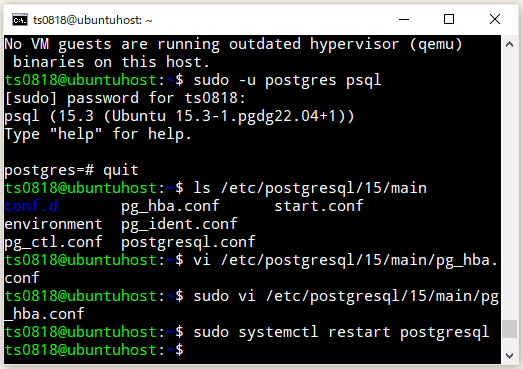
■ユーザー作成
再度、PostgreSQL へ接続し、ユーザーを作成します。
sudo -u postgres psql
CREATE USER dev_web WITH CREATEDB ENCRYPTED PASSWORD 'password';

■データベース作成
作成したユーザーで接続し直して、データベースを作成。
quit
psql -U dev_web -d postgres
CREATE DATABASE sample;
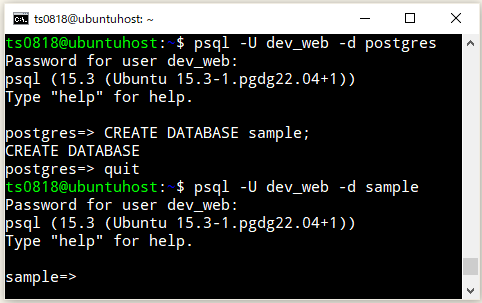
外部から接続してみる。
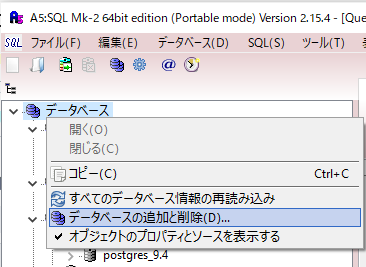
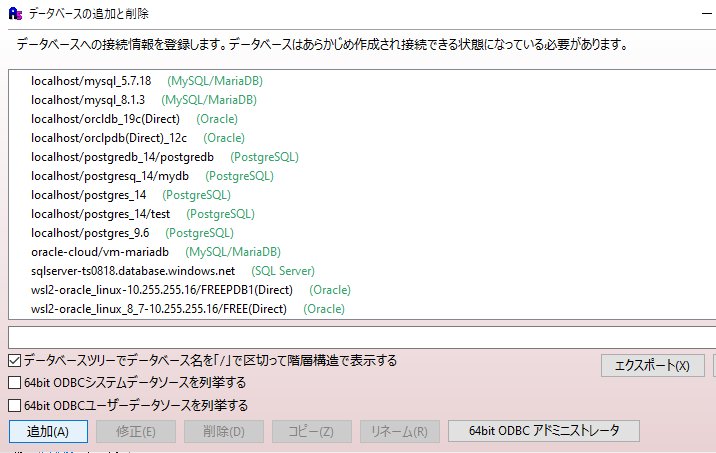
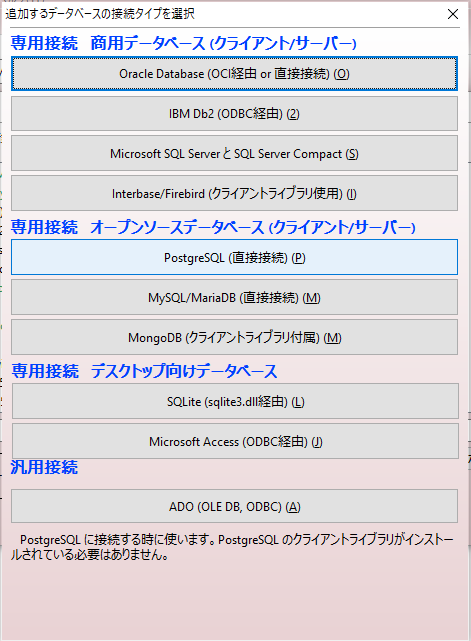
サーバー名は、
⇧ 上記の記事の時に、Avahiを導入して設定したホスト名を設定。

SSLは無効してます。有効にすると、「The certificate is not trusted by the trust provider」というエラーで接続できない...

ユーザーID、パスワードは、「WSL 2(Windows SubSystem for Linux 2)」のUbuntuにSSHできるユーザーのものを設定。

テスト接続を押下。

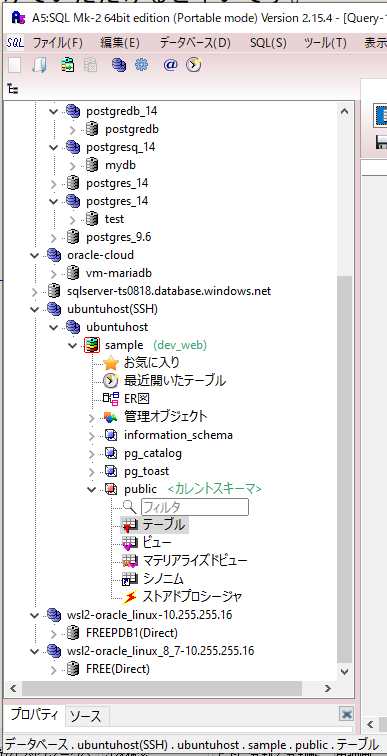
接続できました。
相変わらず、「WSL 2(Windows SubSystem for Linux 2)」の癖が強くて、すんなり接続できなかったんだけどね...
毎度モヤモヤ感が半端ない...
今回はこのへんで。